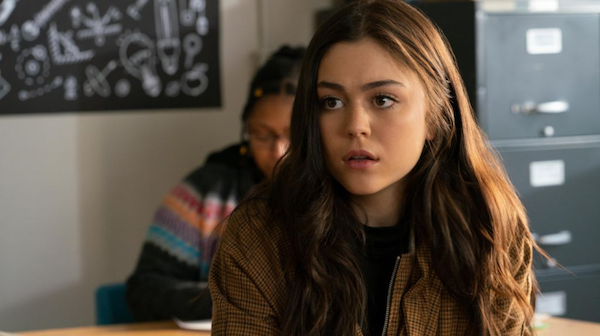Film Review: “Sex Appeal” — Science Meets Teen Sex Romp
By Sarah Osman
This is a fresh take on a teen sex comedy: someone who worships logic sets out to explore the complexity of sexuality.
Sex Appeal, directed by Talia Osteen. Streaming on Hulu.

Mika Abdalla’s Avery Hansen-White — she has a lot to learn about sex. Photo: Brett Roedel/Hulu
Teen comedies rarely make it to cinemas anymore, which are now increasingly the preserves of Marvel and horror flicks, but streaming services have picked up the slack, presenting fresh romps centered around and usually aimed at Gen Z. These new films and TV shows are not your comic romances of yore. They are more inclusive, nuanced, and possess a bit more empathy, much like Gen Zers themselves. Hulu’s latest venture, Sex Appeal, is partly a success in this vein: it serves up a cute and good-spirited exploration of sexuality, but it is hampered by thin characterizations.
Sex Appeal focuses on Avery (a delightful Mika Abdalla), a science perfectionist who is headed to MIT and is determined to win STEMcon for the second time in a row. However, when her long-distance, hunky, science-nerd boyfriend (oxymoron anyone?) asks that they take their relationship to the next level, Avery panics. Sex is the one thing she doesn’t know how to do. An expert on conducting experiments, Avery decides to create an app for STEMcon that will do double duty: not only win the competition, but teach her how to have great sex. The first order of business is to gather the data needed for the app, so she decides to turn to books, movies, her classmates, and eventually her best guy friend, Larson (Jake Short).
This is a fresh take on a teen sex comedy: someone who worships logic sets out to explore the complexity of sexuality. One of the highlights of Avery’s “experiment” is when she engages in sexual acts with Larson. She imagines each one as a by-the-numbers science experiment. During one sensual workout, Avery dreams that she is launching a rocket with Larson as a passenger. In another, Larson is envisioned wandering through a number of pink hallways; he touches the walls and asks which ones feel right to Avery. There is no conventional muss or fuss or embarrassing scenes, such as parents discovering the pair in flagrante delicto. Avery’s experiments are positive and creative looks at teenage sex, and her frank conversations about sex with her classmates are also refreshingly honest and true to life. Some seem to know far more about sex than they should and others are just as clueless as Avery. She also doesn’t limit her studies to straight sex — she interviews a number of queer characters. She learns from a new friend, Danica (Paris Jackson), about the healthy value of masturbation. What her experiments can’t measure is the complex emotions that come with intercourse — Avery doesn’t grapple with them until the film’s third act.
The problem is that the empirical results of Avery’s scientific experiment end up being frustratingly indecisive. That’s partly because the characters come off as fairly one-dimensional. And, if Avery is so smart, why does she know so little? She is clueless about sex, yet her three mothers seem to have no problem talking about it. Why don’t they sit down and have “the big talk” with her, rather than have Avery bounce between their homes while they show her porn? At times, Avery feels a bit like a caricature of a science nerd, similar to the cartoon figures in The Big Bang Theory, and her moms appear to be off-kilter stereotypes of sexually freed women. We also learn very little about Larson — we know that he and Avery have been friends forever and that he once confessed his feelings for her only to get shot down. That’s about it: he just seems to be conveniently around to benefit from a sexy time. Larson and Avery don’t have much chemistry, so their parade of erotic experiences smacks of the absurd. The film would have benefited if it had established more of a meaningful relationship between Avery and Larson. Its ending would have had a harder punch.
Still, one of Sex Appeal’s strengths is its climax. No spoilers here. The film’s third act starts to glide into a predictable turn, but then the plot takes a sharp left into reality. Avery learns that sex is not like coding an app. Human beings are involved, and they are inherently messy. Avery doesn’t just ride off into a contented sunset — she learns that her actions have consequences. The fact that there are repercussions makes this wind-up quietly satisfying, a welcome response to the over-the-top finales of most teen comedies, particularly the de rigueur declarations of love. Is the film proof of a better sex romp through science? The evidence is inconclusive.
Sarah Mina Osman is a writer residing in Wilmington, NC. In addition to writing for the Arts Fuse, she has written for Watercooler HQ, Huffington Post, HelloGiggles, Young Hollywood, and Matador Network, among other sites. Her work was included in the anthology Fury: Women’s Lived Experiences in the Trump Era. She is currently a first year fiction MFA candidate at the University of North Carolina Wilmington. When she’s not writing, she’s dancing, watching movies, traveling, or eating. She has a deep appreciation for sloths and tacos. You can keep up with her on Twitter and Instagram: @SarahMinaOsman
